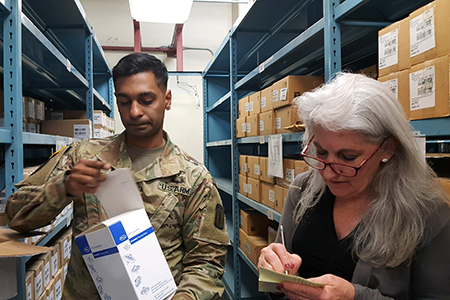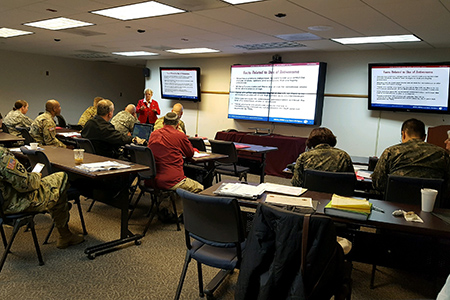Force Health Protection on the Move


Travel across the globe is an essential and sometimes overlooked part of medical product development. As our Warfighters are positioned all over the world, their medical support must be as well. The Force Health Protection Division at the U.S. Army Medical Materiel Development Activity travels annually to the Brian Allgood Army Community Hospital, Yongsan Garrison in Seoul, Republic of Korea, and Landstuhl Regional Medical Center, Landstuhl, Germany, to provide medical product development support.
When our Warfighters are injured and need medical treatment, the goal is to get it to them as soon as possible. The FHP group has pre-positioned Investigational New Drug products in Germany and Korea, to treat our wounded Warfighters when they need it. By positioning these products outside of the continental United States, it allows treatment to happen without the delay of lengthy travel.
These INDs are critical to provide medical support to our Warfighters when the U.S. Food and Drug Administration have no approved treatment. The INDs are used under protocols approved by Institutional Review Boards and the FDA, making life-saving treatment available when other treatments are ineffective or unavailable.
This annual travel is important for the FHP group to personally verify storage and quantity of these potential life-saving products, as well as provide training to local personnel.
Marianne Erlichman, product management support for FHP, has been travelling to these sites with the group since their first trip in September 2004.
"These trips allow FHP to do training with both protocol site staff and interested hospital staff on FHP's IND products, treatment protocols and interim fielding capabilities," said Erlichman.
These site visits not only allow members of FHP to train staff and take inventory of products, they also provide an opportunity to make important in-person contact with key staff and leadership.
"For all product managers, being able to engage with principal investigators, pharmacy staff and logistics personnel in a face-to-face format makes for the most effective management of assigned products," explained Erlichman.
According to Lt. Col. Michael Yapp, director of the FHP Division, the most beneficial aspect to these visits is the "bilateral support reassurance between commands for the IND protocols currently in place."
Erlichman and Katie Devlin, FHP product management support, explained that FHP has had both IND products and a treatment protocol, Intravenous Ribavirin for the treatment of Hemorrhagic Fever with Renal Syndrome, at BAACH for many years, as well as additional product stored at the U.S. Army Medical Materiel Command–Korea at Camp Carroll.
"ROK [Republic of Korea] has had many cases of HFRS, and it was the U.S. Army Medical Research Institute of Infectious Diseases that first brought the Ribavirin treatment protocol to ROK, which was then transferred to FHP in 2004," said Erlichman. "Over the years, the number of cases of HFRS has decreased significantly due to an emphasis on prevention, but other than dialysis and supportive care, there is no other treatment."
LRMC is a site for several treatment protocols with Ribavirin for HFRS, Lassa Fever and Crimean Congo Hemorrhagic Fever, as well as Intravenous Artesunate for severe malaria.
Erlichman and Devlin explained how FHP also has IND products in the LRMC pharmacy and stored at the U.S. Army Medical Materiel Center–Europe in Pirmasens, Germany. These sites have been established for many years due to the fact that Europe has had cases of CCHF, HFRS and severe malaria brought to LRMC for treatment.
"Without these IND products, there is only supportive care to treat the patients," said Erlichman.
This was Yapp's first trip to the sites as the FHP director, and it is clear that he values the work his team is performing.
"These visits support the mission by reassuring our commitment to protect Service Members against high-consequence but low-probability threats," said Yapp.
Advanced product development is so much more than research and management. It takes individuals like those in the FHP Division of USAMMDA, dedicated to travelling across the globe to ensure medical support for the Warfighter. This important work is saving lives, all over the world.













